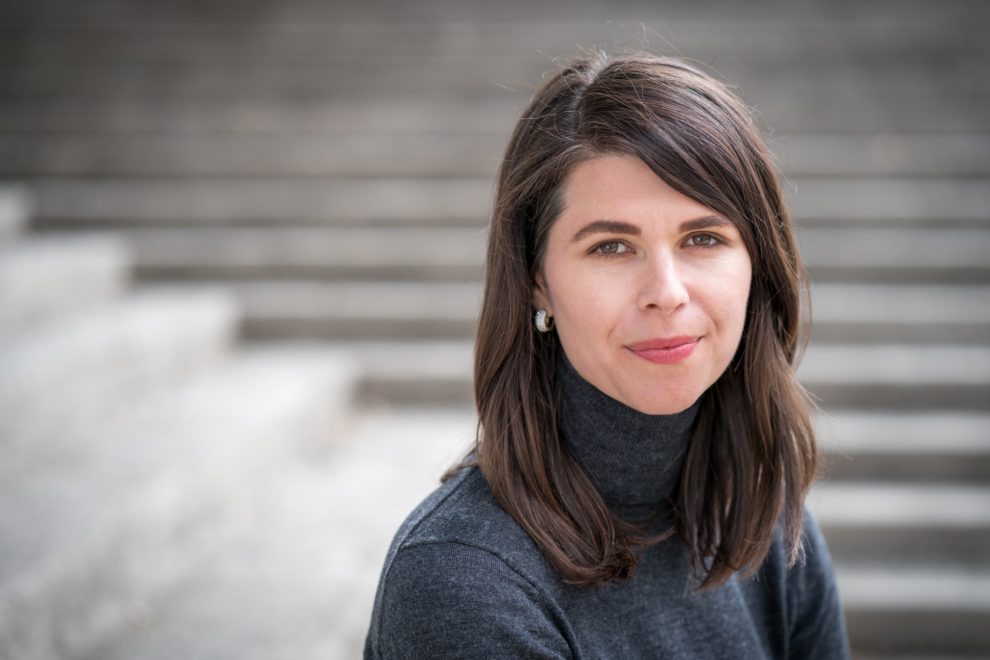The idea seemed obvious to Emily Kirsch.
About a decade ago, she was working with solar lending platform Mosaic on getting funding to help nonprofits in California go solar — part of a push for more green energy solutions by then-President Barack Obama.
Subscribe to the Crunchbase Daily
The work — which included taking in a then-anonymous donation from music icon Prince — led her to working with the greentech industry in general, and the startup community around Oakland specifically.
“I found out I really loved this,” she said of working with startups.
She soon realized the need young companies have not just for capital, but also business support and a place to work.
“I thought, ‘this type of (accelerator) must exist already,’” she said. “But I realized it really didn’t exist around here.”
Kirsch took what little savings she had and co-founded Oakland-based Powerhouse, an organization that continues to evolve even eight years later as it tries to shape the future of clean energy and mobility while helping those who look to innovate in the industry.
A road less traveled
Kirsch’s interest in clean and greentech stretches back further than her work with Mosaic a decade ago.
Born in San Francisco, Kirsch was unsure what to do after graduating from high school. Instead of going to college, she headed to Costa Rica, where she worked on an organic coffee and chocolate farm powered by solar.
When she came back to the states, San Francisco State University attracted her attention because she could create her own major. She settled on the “sustainable urban development” major and the seeds of a life looking at energy and mobility were planted.
After working with nonprofits, Kirsch founded Powerhouse in 2013 as an incubator and accelerator for young energy and mobility startups and rented space on the Oakland waterfront — not typically a haven for venture capital funding.
“I wanted to start it in Oakland,” she said. “Oakland feels more like reality to me than other places.”
Connecting startups
At its high point as an incubator, Powerhouse helped house 125 entrepreneurs from 25 companies, Kirsch said.
However, as much as she enjoyed the community she started, she was tiring of being a landlord and decided three years ago to shift to Powerhouse’s current focus.
Kirsch changed Powerhouse into what she describes as an “innovation firm,” where she helps large technology and energy companies interested in decarbonization and new clean-energy tech meet and partner with startups in the space. The firm has about half a dozen clients, and includes names such as Google, Enel and Schneider Electric.
Those meetings and introductions can lead to partnerships, acquisition and investment, which led Kirsch to the idea of expanding Powerhouse, to now include Powerhouse Ventures.
“We figured we are right there,” she said. “Why not do the best deal right there in the moment.”
Powerhouse Ventures closed its first fund — an oversubscribed $7 million early stage fund — about two years ago and has made 17 investments. The firm’s average check size is $130,000 and it has a goal of making a quarter of its investments in companies founded by underrepresented minorities, Kirsch said.
By the end of the year, Kirsch expects the fund to be tapped with a total of 25 investments. Half a dozen of the portfolio companies already have raised follow-on rounds and another half dozen are likely to follow suit this year.
Kirsch said on average, for companies who have raised follow-on rounds, valuation appreciation for the portfolio companies has been 2.4x.
Powerhouse Ventures is led by an all-female team, something Kirsch did not plan on but has taken note of how well it has worked.
“I feel like we do have to work that much harder,” she said. “But I’d say it definitely feels like more of an asset than a liability.”
Powerhouse serves an important function in the clean energy sector, said Kevin Berkemeyer, CEO of San Francisco-based Station A, an AI-powered clean energy marketplace.
“The number of entities who give (cleantech companies) that first check is few and far between,” he said. “Emily and Powerhouse have stepped in and filled a critical gap in industry.”
Considering the investor and customer introductions the firm gives young companies, as well as marketing and communication support, Berkemeyer said Powerhouse is the best “first check” his company could have taken.
“They are the go-to vehicle for people trying to connect to the startup community,” he said
The future
Even though the current iteration of Powerhouse is new, Kirsch still has an eye on the future.
She has a monthly podcast called “Watt It Takes” produced in partnership with Greentech Media, which has tens of thousands of listeners. She hopes the podcast is the first step in building out a possible media element to Powerhouse.
Kirsch also can envision a day when Powerhouse is the “go-to” firm for all large corporations looking to decarbonize and embrace cleantech, while it also continues to spot investment opportunities in innovative young startups.
“I think as time has worn on, people see the value we bring,” she said. “I hope we can be an example of how successful — and profitable — something like this can be.”
Photo of Emily Kirsh, founder of Powerhouse Ventures, is courtesy of Rick Chapman.

Stay up to date with recent funding rounds, acquisitions, and more with the Crunchbase Daily.



![Illustration of a guy watering plants with a blocked hose - Global [Dom Guzman]](https://news.crunchbase.com/wp-content/uploads/quarterly-global-3-470x352.jpg)
![Illustration of remote meet on cellphone, unicorn chess piece and money. [Dom Guzman]](https://news.crunchbase.com/wp-content/uploads/business-strategy-470x352.jpg)


![Illustration of a guy watering plants with a blocked hose - Global [Dom Guzman]](https://news.crunchbase.com/wp-content/uploads/quarterly-global-3-300x168.jpg)
67.1K Followers